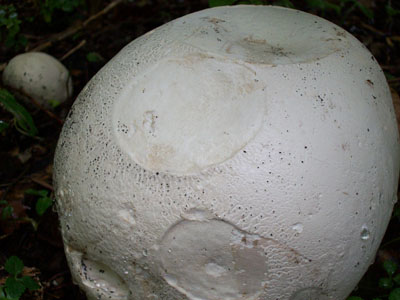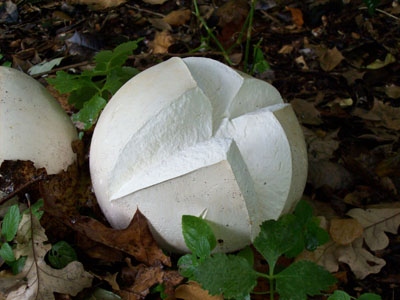
In mid fall, from early to mid October, large white fruiting bodies of the fungus, Calvatia gigantiea can be found popping up from the ground. Giant puffballs are in the class of fungi known as Gasteromycetes or “stomach fungi” as all the spores are contained internally. When immature they are pure white inside and out and are edible (see disclaimer below).
As they mature, they will darken and the skin will thicken. The spores will turn dark brown to black and will be dispersed by wind, rain or human/animal activity. Typically puffs of dark spores disperse when kicked , hence the common name. The puffball can typically reach softball to basketball size, but some up to three feet in diameter have been found. Sometimes in the woods, they will form large circles or fairy rings as the micelium spreads.

Calvatia gigantea splitting open. photo credit: J. Coceano
I have found no information to indicate that they are harmful to the garden. They are somewhat of a curiosity, as they will grow in size quickly. When the puffball matures, it will eventually dry out and turn a brownish color. The outer covering will split open and as the spores are dispersed , you will find they are hydrophobic (almost impossible to wet.) As the puff ball degrades, it will become unsightly and can be removed at any stage as it loses its appeal.
Now as far as eating, they are edible when soft and pure white inside and out. One recipe, I found says to cut them in ¾ inch strips, dip in a beaten egg and water mix, and dip in bread or cracker crumbs. Fry the strips in olive oil and or butter in a pan until golden brown. If you find a lot of them and like them, you can precook them, freeze them and heat them up in a skillet later. Several years ago intern and gastropod, John Mannion, prepared some in the kitchen at the Arboretum office. It was interesting to try them.
And now the disclaimer; wild mushrooms and fungi can be very poisonous. Every year people die or become severely ill from eating what they thought was a good mushroom. If you are not sure do not eat it. There are classes on foraging for wild mushrooms, conducted by experts, that will help you to learn the right ones.
